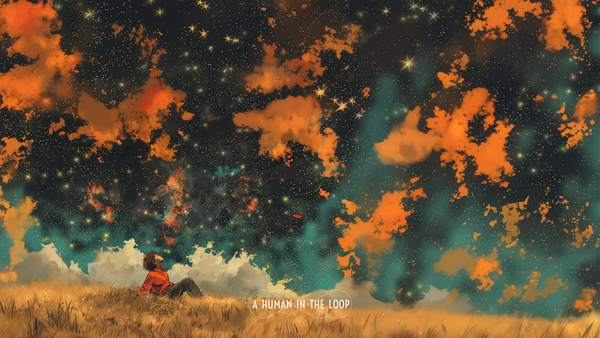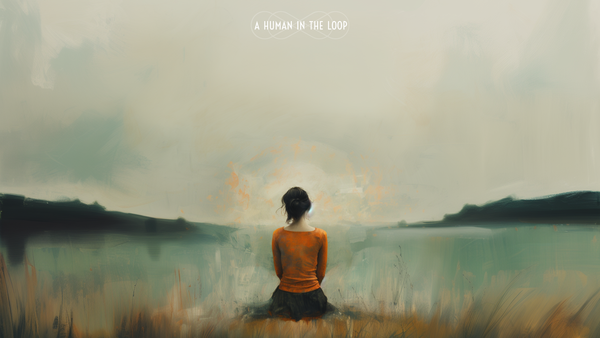AI isn't the problem; We are. (Part Two)
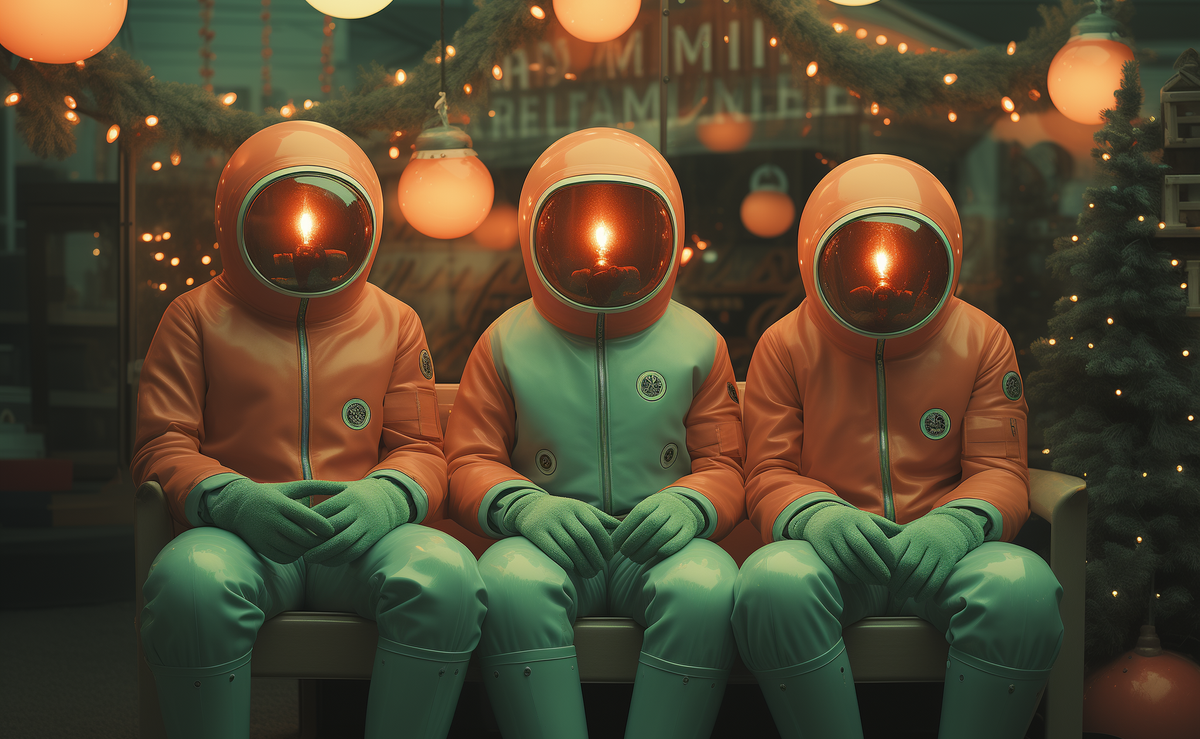
In Part One, I invited you on a journey of metaphor, overwhelm, and self-doubt down the AI research rabbit hole, where we got lost in the kaleidoscopic Wonderland of the internet.
In Part Two, I share a story about a disappointed boy longing to create. Spoiler Alert: the boy is me.
Be sure to check out the linked articles I share at the end.
Oh! And I made you a 4-hour Holiday Music Spotify Playlist. Let me know what you think and if you find a new holiday bop. Thank you for reading! Happy Holidays!
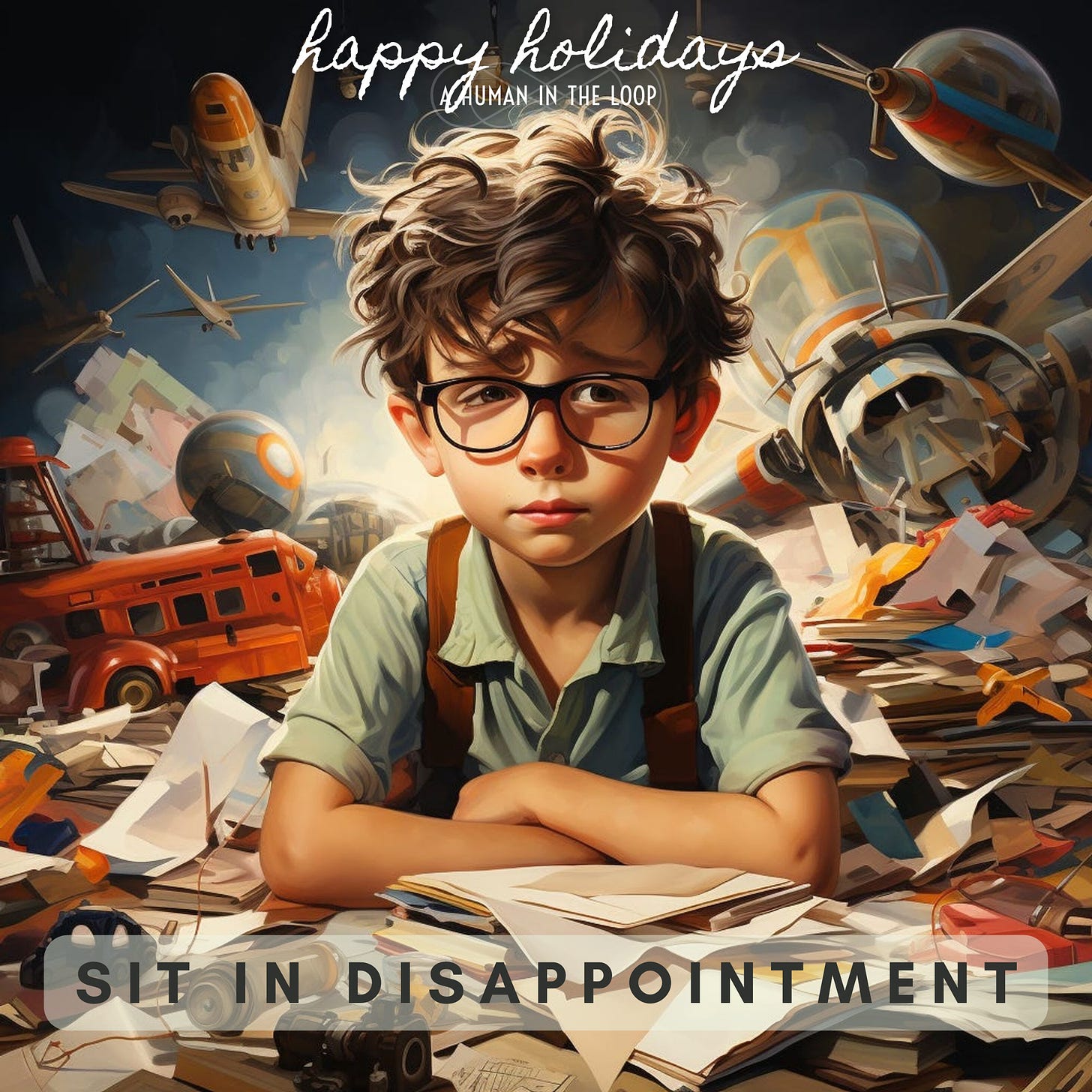
In a world that is messy, overwhelming, and painful, art is inevitable.
As a kid, my creativity was encouraged. Art was my favorite subject in school — even if my third-grade teacher scolded me in front of the class for coloring outside the lines. Yep, I still haven’t let that go.
The real challenge was finding the right medium to express my creativity.
The tools never quite worked for me.
Trips to the craft store or Toys “R” Us with my mom always meant new art supplies or boxed projects to assemble. I made a mess with oil pastels and gave up on watercolors before they had time to dry, stepping over model airplane parts scattered about — a casualty of a war it never had a chance to fight.
Vivid images in my mind would land on the blank surface, warped or damaged, like an Amazon package or your luggage going through JFK on Christmas Eve. With every attempt, the output was always a disappointment.
I didn’t have the resources or patience to develop the technical skills.
I also acknowledge that in the early 90s, the digital tools available didn’t help. The images in my mind would, constrained by the limitations of the era, would need to stay grounded for now.
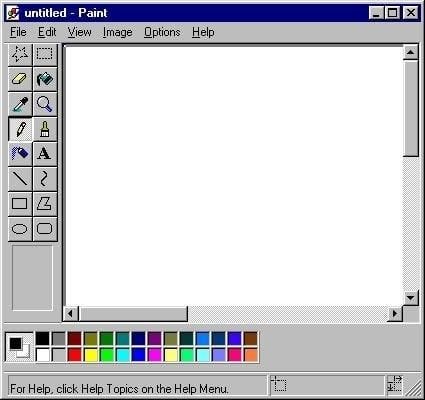
New Tools
This year's advancements in AI have opened the floodgates to a deluge of product launches, news articles, social media content, generic writing, and fast food artwork.
In the U.S., it has also brought layoffs, a little Silicon Valley drama, a White House intervention, and the usual backlash from the court of public opinion.
Creativity has been democratized, inundating the web and social media with content. Easy access to tools that create high-quality outputs has oversaturated the market, worsening the perceived visibility of many freelancers, artists, and creators.
This also applies to writers, actors, and other creatives whose written works, physical likenesses, and voices are now accessible for anyone to replicate in minutes.
For many, advancements in AI — specifically how these models were trained — continue to be a contentious topic.
The slightest mention of AI quickly shifts to name-calling, accusations of theft, anti-AI propaganda, and responses like the one below are pretty common these days.
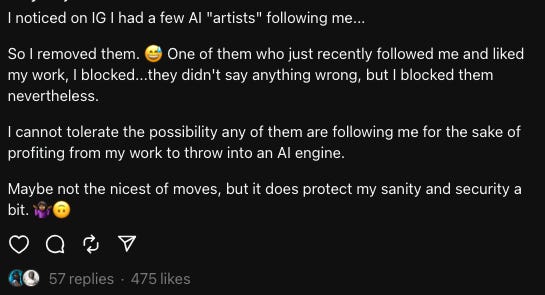
The irony is that most anti-AI commentary, specifically on Instagram and its sister-site Threads, hinges on the singular ethical concern over creative works and intellectual property being used without consent, credit, or compensation to the original creator.
I hate to break it to you, but we recently learned that Meta has been doing the same on their sites.
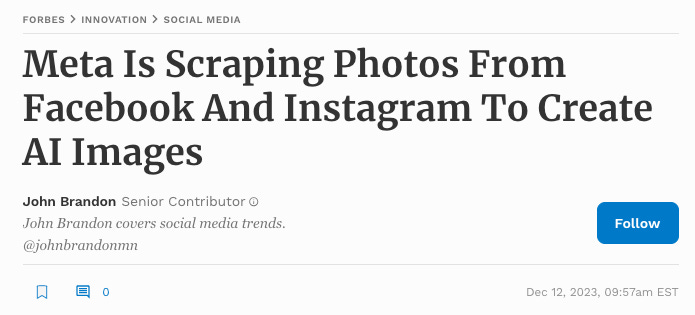
If you can look past the clickbait headlines, hidden underneath the layered soundbites about AI stealing jobs and the endless anti-AI art rhetoric on Meta’s Threads, you can hear the real reason for their AI disdain. The root case (besides capitalism) is:
We don’t value artists.
Although market value and intrinsic value are closely related, in this context, I am speaking to monetary compensation: What is it worth to you? What would you pay?
We might appreciate artistic outputs — products to be sold — but we don’t value the process. We’ve grown to love the wow, the magic, the “ooooh pretty!” without fully understanding the work that happened behind the scenes.
We don’t value the years of experience, time, effort, skill, and heartache that inform the creative process.
Fast Food Art
The quality of outputs generated using AI runs the gamut. Some people, myself included, spend hours tweaking and modifying the generated image until we’re satisfied. I never am.
But as they say, If it’s fast and cheap, it won’t be good.
We want instant. We want magic. We want what we want when we want it.
And we can’t blame AI for that behavior. That’s all us. We did that.
So, are we really surprised Big Tech has changed the rules again, opening the fast-track lane to being an artist?
Google search made everyone believe they were instant “experts.”
TikTok gave influencers celebrity status – and everyone else was left with the dream to one day be.
OnlyFans enabled your neighbor to be a pornstar. (Good for them!)
We’ve created a culture — and an entire generation — expectant of instant gratification.
Skills are looked up, not learned. Applying for a job, if you can get past the resume ATS filters, continues to be about who you know, not what you can do. Solopreneurs are at the mercy of algorithms and paying to boost posts to market their businesses.
Like genetic markers indicating potential for disease, Capitalism is in our DNA.
Yet, I continue to see the blame thrust at people who took an idea, formed it into words, and used technology to make it real—a manifestation of their imagination.
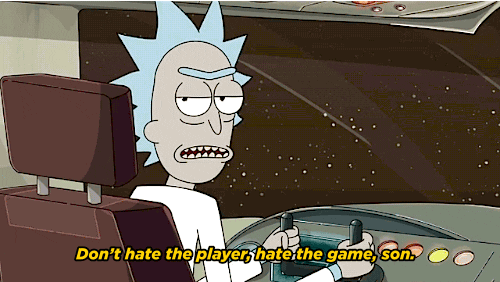
My experience using Midjourney and other digital tools has been deeply gratifying.
The disappointed boy in me can finally bring his imagination to life and share it with the world.
Every Time AI Art is Shared, an Artist Becomes a Critic. 🔔 👼🏼
Why are we criticizing creativity at a time when it feels like everything is falling apart?
It's like dismissing a child at an arcade who excitedly comes to show you the cheap toy they won from the claw machine. Let them have their moment of joy!
It may be fast food art, but sometimes you’re hungry and need to eat. So, let them enjoy their Taco Bell before you start explaining how bad processed foods are. Cool?
I assure you there isn’t a machine randomly spitting out artwork on its own. Moreover, the quality of AI outputs typically reflects the skill and creativity that the user put into the work.
We’d be wise to focus our precious attention on our own creativity process and less on criticizing.
Words Matter
There is a danger in how we talk about AI — our hopes, fears, and rage — specifically the words we choose to describe it.
We love to anthropomorphize technology to make it feel less threatening — Hey, Miss Google Siri Alexa!
When we say that AI is doing [insert verb], we absolve a human from their role in AI programming and utilization.
This is a distraction. It redirects our attention away from the real villains in this narrative.
Hal 9000 wasn’t just being a dick; a human programmed him to be a dick.
Does anybody remember that person’s name? Nope, neither do I.
There is often a human in the loop. We should focus on their intentions and if their motives are for people or for profit.
Our word choice should reflect that truth.
AI isn’t stealing jobs. Employers are choosing the cheaper option; and companies don’t want to compensate their human employees for what they’re worth.
AI isn’t replacing artists. We want to consume art and creative content, but we don’t value it enough to pay artists what they’re worth.
Some people are fine with cheap outputs, but you get what you don’t pay for — so don’t be surprised when it doesn’t hold up in quality or originality.
Creating a Path Forward
I can be proud of what I’ve been able to share through my writing and artwork while acknowledging the complex ethical concerns and broader implications we’re all being forced to face in the wake of AI advancements.
In-fighting and pointing fingers at each other only keep us distracted, divided, and further from defining a collective goal.
Let’s be done with bullshit and figure out a path forward. Otherwise, one will be made for us.
To make such changes a reality, however, we need to unite. we need to recognize that the strip-mining of creative workers is part of a broader project in service of an oligarchy—that it’s not just creators and independent producers who are being screwed over, but almost everyone, as wealth keeps being inexorably funneled toward the rich. The death of the middle-class creator is part of the death of the middle class.
Cory Doctorow, Chokepoint-Capitalism
Essential Holiday Reading
- The Tyranny of Convenience - The New York Times
- In Defense of the Psychologically Rich Life - Scientific America
- Big Tech has long avoided responsibility for online content. Generative AI could end that. - Business Insider
- Pluralistic: 2024's public domain is a banger (20 Dec 2023) by Cory Doctorow
- In digital and AI transformations, start with the problem, not the technology by Eric Lamarre - McKinsey & Company (podcast)
ENJOY!
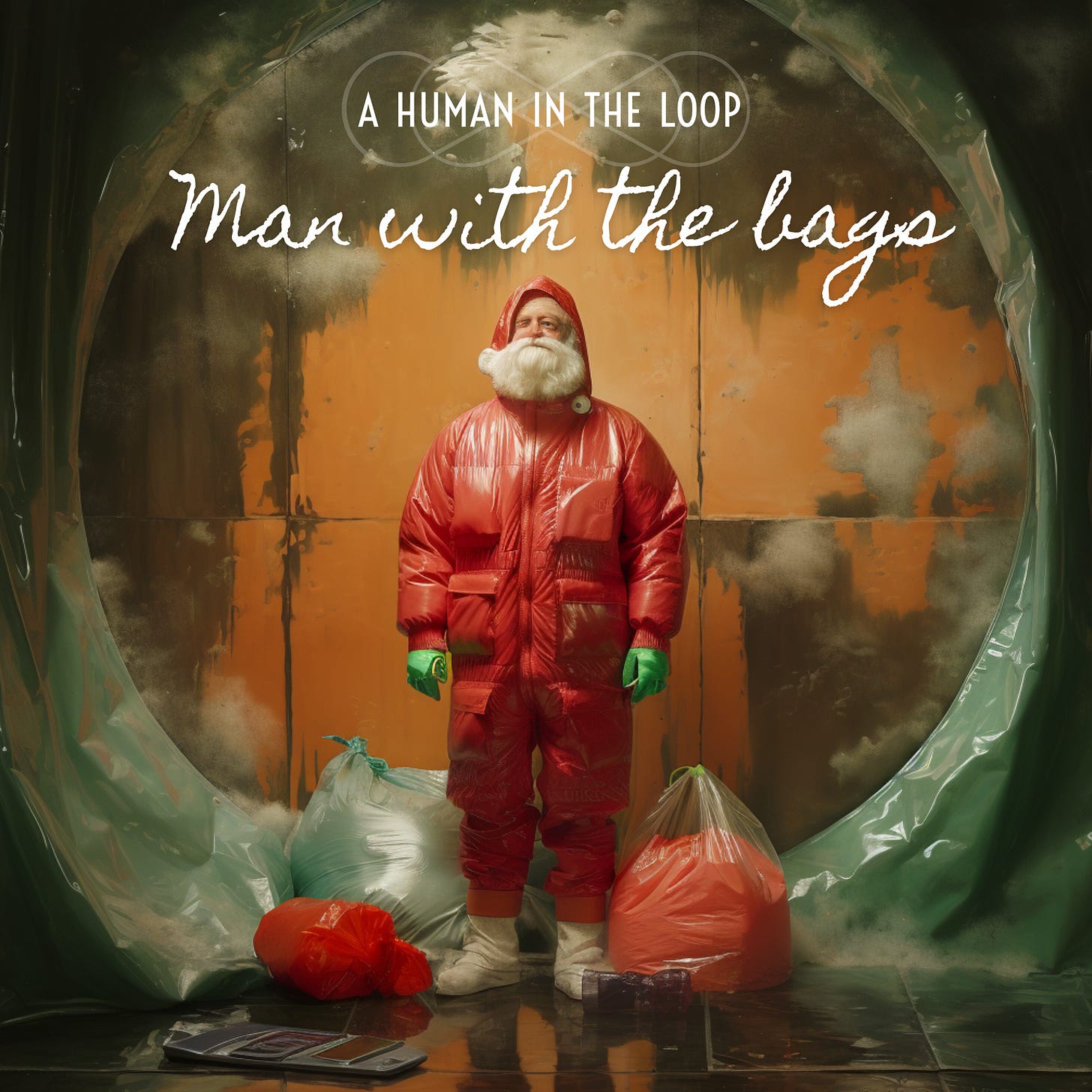
Christmas is my least favorite holiday, but curating playlists is my love language.
Here are over four hours of holiday tunes from across genres to add more joy to your holidays.
I hope you enjoy it! Feel free to share it! And let me know if you discover your new favorite Xmas bop!
Companion Spotify Playlist - Xmas Holiday Edition



